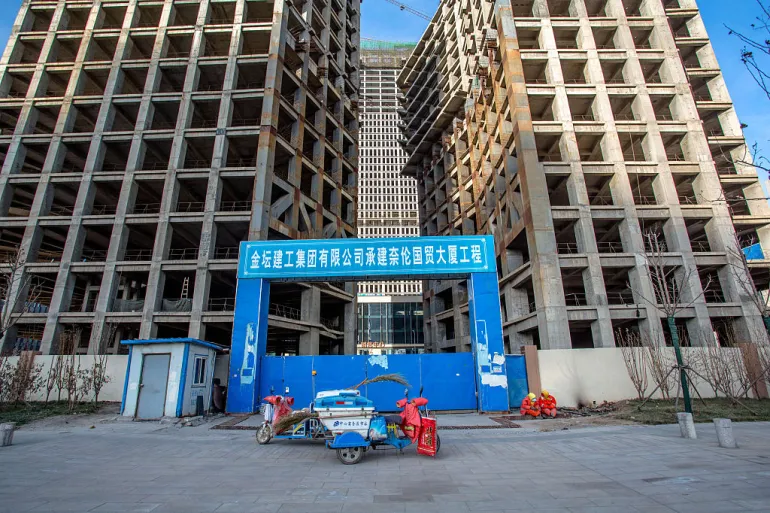The basic architecture of Chinese economy is broken
Since 2021, China’s CSI300 benchmark stock index declined by nearly 42%. The decline has been a sharp 19% in the last 12 months. All global indices relating to Chinese stocks – like the Hang Seng China Enterprises Index (HSCEI) of Hong Kong or Nasdaq Golden Dragon – suffered a similar fate. Overall, nearly $7 trillion investors’ wealth is eroded. The amount is equivalent to the combined gross domestic product (GDP) of Japan and Germany.
“Every index tracking China share prices had a terrible 2023…At the same time, markets from Tokyo to Mumbai to New York enjoyed solid gains,” remarked Jeremy Mark in a blog published by Atlantic Council on February 9, 2024. Mark is a senior fellow with the council’s Geoeconomics Center. He pointed out a rising trend of investors’ funds pulling out of China for India, where the market has been booming for the last five years.
Beginning in February 2019, India’s benchmark NIFTY50 increased by 103%. The index is up by 55% since 2021. And, over the last year – when Chinse shares were on a free fall – the Indian stock index had shot up by 22%. “Western firms shift investment from China to India as worries mount,” Reuters reported from Beijing on September 13, 2023. “Wall Street snubs China for India in a historic market shift,” Bloomberg reported on February 6, 2024.
The market crash has hit China hard. The public issue market has dried up and start-ups are starving for cash. But, that is not the only worry of Beijing. Whatever is happening in the stock market is the manifestation of a much bigger crisis in the economy.
The real estate sector – which contributes one-fourth of China’s GDP – is in ruins. Chinese developers – including the world’s largest, Evergrande – defaulted on repayment of loans. Government bankruptcies trailed the property market. Till the crisis struck, China’s local governments were minting money through land sales to developers. The revenue stream allowed them to raise nearly $13 trillion in debt. In the changed scenario, the revenue stream had dried up. Local governments and the entire financial system are saddled with $13 trillion debt.
China’s overreliance on real estate has sent its economy tumbling toward 2008-era financial conditions, Kyle Bass told CNBC in February this year. Bass is the founder of the Dallas-based hedge fund, Hayman Capital. “This is just like the US financial crisis on steroids,” he said. “They have three and a half times more banking leverage than we (the US) did going into the crisis. And they’ve only been at this banking thing for a couple of decades.”
According to the famed capital market expert, the years of double-digit growth China enjoyed before the pandemic were made possible by an unregulated real estate market, which leaned too heavily on debt to expand. With defaults now plaguing the industry, this spells massive trouble for the country’s broader economy.
The impact is not limited to some GDP numbers. During all these years of growth, Beijing directed 70% of household savings to real estate. Common Chinese did not have any other option to grow money. Banks do not give interest on savings to ensure cheap credit to industry. Till a decade ago, there were not many financial products and, the common Chinese had a serious distrust to their stock market. Real estate was the only vehicle available. Beijing ensured that citizens get easy home loans and keep buying property. The sustained and artificial, debt-driven boom in real estate ensured the return of money.
The bubble has finally burst sinking household savings and huge quantities of bank finance. The problem surfaced in 2021 when Evergrande defaulted on repayment and its projects were stalled. Sooner or later the entire sector was gripped by crisis. New home building slowed down. Citizens had hit the streets denying to pay mortgages for unfinished homes. China first tried to apply force. The fateful image of a battle tank rolling down the street to disperse the mob protesting before a commercial bank is etched in the memory.
Under pressure, Beijing backed down and gave citizens remission from mortgage payments but consumer sentiment declined to a three-decade low. Chinese citizens never felt hopeless about their economy since the opening up in 1978. A slowdown in exports, and low consumer confidence at home, together struck China. “The basic architecture of the Chinese economy is broken,” the Hayman Capital founder said.
As told by Bass, whatever has happened in China has an uncanny similarity to the subprime-led boom and the eventual burst in 2008, in the US. Among the differences, the US crisis was handiwork of capital market operators and, the boom lasted for barely a few years. Once the crisis surfaced, American authorities went into a firefighting mode and saved the world economy from wider risks. In non-democratic China, a totalitarian regime nurtured and raised an artificial boom for nearly three decades. Beijing knew that it had reached monstrous levels and would burst. But, they didn’t act in time. They are still not open in admitting their mistakes and are beating around the bush.
___________________________________________________________













